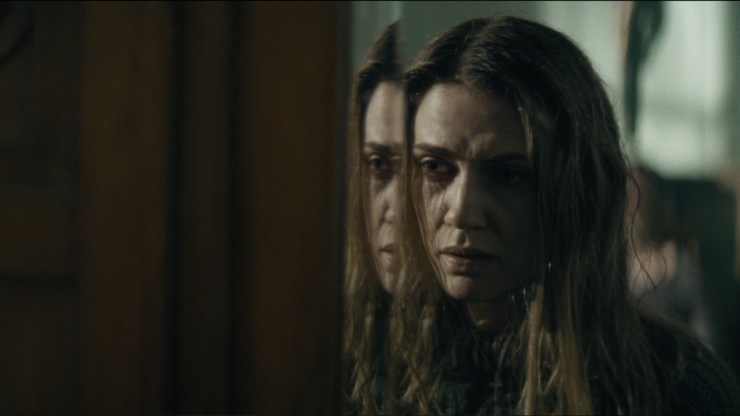Any seasoned horror fan has seen their share of possession films. From The Exorcist (1973) to The Conjuring (2013), the genre has produced countless iterations of a tried and true format. The subject, usually young or otherwise vulnerable, encounters a demonic entity through direct contact with a cursed artifact, entrance into a forbidden locale, or some sort of moral or ethical transgression. The entity takes over control of their body and they become a danger to family and friends.
These films usually climax in an exorcism steeped in Catholic tradition: a heroic Priest armed with holy water and scripture attempts to cast the demon out. The possession film’s success usually lies in its execution and the moral message underlying the horror. Antonio Negret’s Shaman spins this tired genre in a new direction by deconstructing the tropes we’ve all come to accept. What appears to be a fairly standard possession film morphs into a timely exploration of religion itself.
Candice (Sara Canning) is a missionary in rural Ecuador diligently working to convert the locals. In addition to baptisms and evangelical education, she’s preparing for the confirmation of her tween son Elliot (Jett Klyne). But the willful boy disappears shortly before this important ceremony and Candice lies to hide her embarrassment. She finds him on a cot in the humble home of a local Shaman (Humberto Morales) who seems to have rescued him from a dangerous cave. After this distressing incident, a rash of bad luck falls upon the tiny town. Elliot exhibits malevolent behavior and Candice becomes convinced that the Shaman has poisoned her son. Terrified, she turns to Father Meyer (Alejandro Fajardo) for help, but finds that whatever spirit possesses the boy may be older and more powerful than her chosen God.
In outward manifestations of Elliot’s possession, Negret doesn’t break much new ground. A shadowy entity emerges from darkness and slowly begins to invade his body, causing sinister visions for those in his orbit. Scorpions seem to crawl out of his clothes while inky, black liquid bleeds from his eyes and mouth. Though eerie, these visual indicators are the film’s Achilles heel, rehashing tropes we’ve seen time and again. But Negret resists overusing CGI trickery and Klyne wisely delivers a grounded performance. Terror springs from Elliot’s sly and subdued actions rather than bombastic displays of the demon’s power.
Fortunately, the film’s gorgeous landscape provides a visual counterpoint to this artificial terror. Negret creates an ominous feeling of isolation as Candice’s sense of safety slowly dissipates. When Elliot begins violently convulsing, the frightened parents realize that the only doctor available is three days away. A fire rapidly spirals out of control with only a handful of locals to extinguish the blaze. Striking cinematography combines with a sense of mounting dread as Candice’s altruistic intentions begin to curdle. The climactic cleansing ritual does get a bit unwieldy and Negret struggles to portray metaphysical experiences, but a shocking twist propels the film into new territory as underlying themes finally take shape.

Shaman rises above standard possession film fare due to shrewd criticism of the Catholic Church. Elliot catches the malevolent entity’s attention when he recklessly goes where he doesn’t belong—a metaphor for Candice’s colonial mission. She resists the Shaman’s repeated attempts to help and orders him to leave her home, forgetting that she’s living on his ancestral land. Cracks begin to form in her pious veneer revealing the hypocrisy of her moral convictions and a dangerous streak of narcissism. Like a possessing demon, she has entered a community that is not her own and begun transforming it from the inside out. A shocking conclusion reveals exactly who Candice and her family truly are and the lengths they will go to protect themselves.
At first glance, Shaman is a fairly standard possession film set in the picturesque mountains of Ecuador. But Negret is playing with deeper themes and exploring the dangers of religious supremacy. It’s a welcome condemnation of colonialism at a time when Evangelical Christians seem intent on reshaping the world in their own image. However, Shaman is not explicitly anti-church, but an evisceration of those who would use the trappings of Christianity for their own selfish gain. We’re left to wonder who poses the greater threat to the people of this tiny community, the god of death locked away in a cave or the missionaries determined to save their souls.
Shaman is now available on VOD outlets.


!['Shaman' Deconstructs the Standard Possession Film [Review]](https://www.newsbeep.com/ca/wp-content/uploads/2025/08/1754706490_image-62.jpg)